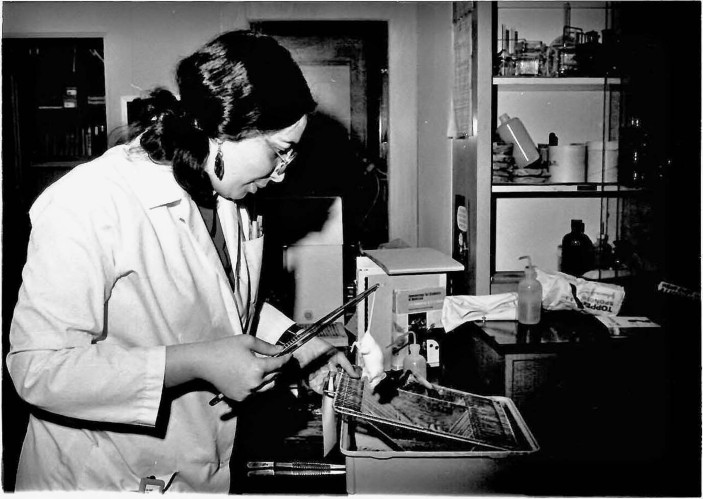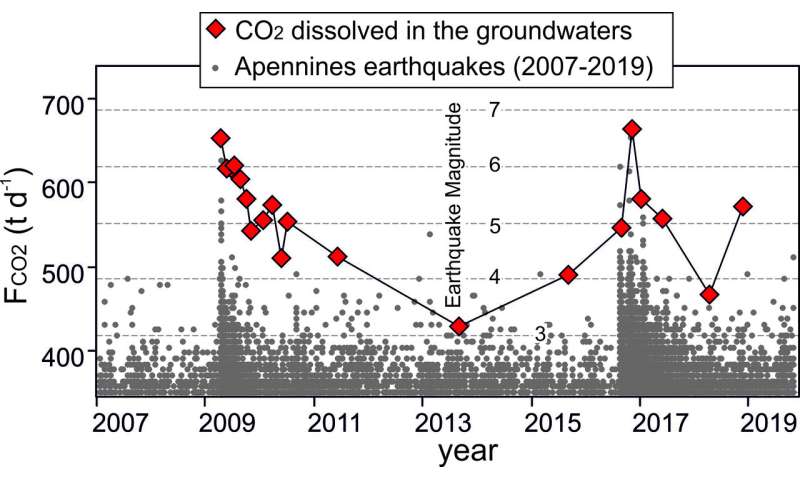Nancy Boudreau1,
Mina Bissell2
See all authors and affiliations
Science 28 Aug 2020:
Vol. 369, Issue 6507, pp. 1059
DOI: 10.1126/science.abe0952\
Zena Werb, renowned cancer biologist, passed away on 16 June. She was 75 years old. Zena was recognized internationally in the fields of proteolysis, development, and inflammation in breast cancer. Her studies of the development of the mammary gland and its neoplastic conversion during the initiation and progression of breast cancer revolutionized the fields of development and tumor biology and metastasis. Zena also served as a mentor and role model for myriad scientists.
Zena was born in the Bergen-Belsen concentration camp in Germany in March 1945. Her parents had been forced to separate during World War II, but after a fortunate reunion, they moved to Canada in 1948. Zena earned a bachelor's degree in biochemistry and physiology from the University of Toronto in 1966 and a Ph.D. in cell biology from the Rockefeller University in New York City in 1971. She conducted postdoctoral research at the Strangeways Research Laboratory in Cambridge, United Kingdom, where she studied matrix metalloproteinases (MMPs)—a type of enzyme that breaks down proteins—and then she taught briefly at Dartmouth College in New Hampshire. In 1976, she launched her own laboratory at the University of California, San Francisco (UCSF), where she would spend the rest of her career, most recently as professor and vice-chair in the department of anatomy and the associate director for basic science at the UCSF Helen Diller Family Comprehensive Cancer Center.
Through her pioneering work, Zena demonstrated the critical roles of MMPs in tissue functions during development and in disease. In the late 1970s and early 1980s, emerging evidence suggested that the extracellular proteins, which were targets of the lytic activity of MMPs, were providing not just structural support for cells but also cues that directly influence cellular signaling and behavior. These interactions between cells and extracellular proteins were suspected to be both dynamic and reciprocal. Zena elegantly showed that when cells bind to the extracellular protein fibronectin through a specific cell-surface receptor, intracellular signaling changes and the cell's production of MMPs increases. This critical piece of data demonstrated the bidirectional nature of interactions between cells and their extracellular environment (i.e., dynamic reciprocity).
Knowing that a complete understanding of MMPs would require the study of the complex biology of a variety of organs and conditions, Zena immersed herself in the biology of bone, mammary and salivary glands, embryonic development, wound healing, and then cancer. When the cancer field was coalescing around the notion that MMP inhibitors might prevent tumor metastasis, Zena was one step ahead. She knew that this strategy would wreak havoc on normal tissue function and potentially exacerbate the disease and also that metastasis was much more involved than simple protease-assisted breaching of basement membranes

Zena's research provided a molecular and mechanistic framework for understanding how the extracellular matrix contributed to tissue morphogenesis and remodeling and the tumor microenvironment. Her ground-breaking proposals required both courage and insight. In recognition of her pioneering work, she received the Excellence in Science Award from the Federation of American Societies for Experimental Biology, the E. B. Wilson Medal awarded by the American Society for Cell Biology (ASCB) “for far-reaching contributions to cell biology over a lifetime in science,” and the ASCB Sandra K. Masur Senior Leadership Award. In 2010, Zena was elected to the National Academy of Sciences.
I (M.B.) became a close friend and collaborator of Zena's in 1987. I (N.B.) met Zena when I was a postdoctoral fellow in M.B.'s lab; Zena was a co-mentor for our work on cell death and the extracellular matrix. We both remember how excited Zena was about every experiment, regardless of success or failure. She had a passion for exploration and an ability to distill highly complex biological questions into manageable and testable hypotheses.
Sharing knowledge with students was a thrill for Zena. When she taught, her mesmerizing encyclopedic knowledge was on full display. Those who did not know Zena personally were sometimes intimidated by her direct style, which was evident in her keynote lectures and her questions to other presenters. However, her eagerness to ask the difficult questions and her expectation of thoughtful answers were rooted in her passion for good science.
Those of us who were fortunate to know Zena personally found her to be kind-hearted and generous. She was never too busy to provide advice to the many who sought her input. She was sincerely interested in her mentees and loved to engage in lively discussions with colleagues, always showing an interest that extended beyond their ideas to their personal well-being. Her support for students and colleagues was well recognized: The American Association for Cancer Research and its Women in Cancer Research member group gave her the Charlotte Friend Memorial Lectureship for her meritorious contributions to the field of cancer research and her work advancing women in science. UCSF also honored her with a Lifetime Achievement in Mentoring Award.
Zena's extraordinary career and research were complemented by her humility and humanity. She will be remembered for her original, creative, and fearless thinking, which led to her seminal work demonstrating how the extracellular environment influences the function of normal and malignant cells. Her rich legacy supporting the careers of others will live on in the scientists she mentored.
- Obituary
- Published:
Zena Werb 1945–2020
Nature Cancer 1, 753–754(2020)
Unlike 30 years ago, when the notion of tumor cells being regulated by cell-extrinsic mechanisms was akin to heresy, the tumor microenvironment (TME) is now recognized as a hallmark of cancer, with a broad community of researchers focusing on how it regulates malignant transformation, metastasis and therapy response. We owe this evolution in thinking to several scientific giants, but perhaps none more impactful in changing the storyline than Zena Werb, our intellectually fearless colleague, beloved mentor and generous friend, who died suddenly on 16 June 2020 at the age of 75.

Zena Werb as a graduate student at Rockefeller University, circa 1971. Credit: Rockefeller Grad – News and Notes. June 1971 Vol 2. No 10.
Zena was a professor and vice chair in the Department of Anatomy at the University of California San Francisco (UCSF) for over 40 years and was the associate director for basic science at the UCSF Helen Diller Family Comprehensive Cancer Center. Her foundational work on macrophage physiology, the extracellular matrix (ECM), mammary gland development, breast cancer and tumor-associated inflammation made her one of the most respected researchers in the world. Zena’s contributions led to numerous awards and honors, including election to the National Academy of Sciences and the American Association for Cancer Research, presidency of the American Society of Cell Biology, the E.B. Wilson Medal from the American Society of Cell Biology and the Paget-Ewing Award from the Metastasis Research Society. However, Zena, as a devoted mentor and a fierce advocate for junior faculty and particularly women, took special pride in the UCSF Lifetime Achievement in Mentoring Award, which she received in 2015. Thus, the story of Zena Werb and the TME is also the story of her dedicated mentoring.
Zena was born in 1945 in the Bergen-Belsen Nazi concentration camp in Germany. After the war, her family emigrated to Canada, and she grew up in a rural community, where she attended a one-room schoolhouse. Following her undergraduate studies, Zena conducted her graduate research with Zanvil A. Cohn at Rockefeller University, focusing on lipid metabolism in macrophages. Despite being biochemically inclined, Zena was enthralled when she first observed macrophages moving in real time under the microscope — an experience that laid the foundation for her later love of cell biology, innate immunity and intravital microscopy. During her postdoctoral training with John T. Dingle at the Strangeways Research Laboratory, in Cambridge, England, she began investigating a new (at the time) family of proteolytic enzymes secreted by fibroblasts, called matrix metalloproteinases (MMPs). This class of ECM-remodeling enzymes would comprise another cornerstone of her life’s work. After starting her own lab at Dartmouth Medical School, Zena relocated to UCSF in 1976, where she quickly established her reputation as a rigorous and prolific scientist. Much of her early independent research focused on fibroblast and macrophage MMPs, and she and her first postdoctoral fellow, Michael J. Banda, were the first to purify and characterize MMP12.
Her research on MMPs and their targets led her to study ECM remodeling and resultant cellular behavior, including cell proliferation and survival. Some of her seminal work laid the framework for new fields of research investigating the microenvironmental regulation of developmental processes, tissue homeostasis and disease pathogenesis, including cancer. Establishing these new areas was interwoven with launching the careers of some of her other early trainees, including James McKerrow, Steven Frisch and Caroline Alexander. It was also during this time frame that Zena forged an enduring collaboration with Mina J. Bissell, who introduced her to mammary gland development and cancer. Together they published innovative research that changed the fields of cell biology and cancer, including studies on how ECM remodeling regulates mammary gland branching morphogenesis and involution, stem cell behavior, and cancer cell invasion and metastatic dissemination. This pivotal collaboration also launched the careers of numerous trainees, including Nancy Boudreau, Leif Lund, Andre Lochter, Farrah Kheradmand, Derek Radisky, Bryan Welm, Mark Sternlicht, Laurie Littlepage and Valerie M. Weaver, many of whom are recognized as leaders in their fields. Zena and Mina loved to challenge prevailing dogma. Among their notable work from this period was demonstrating that collagenolytic enzymes lead to the generation of oxygen radicals, and that ECM remodeling regulates growth factor receptor and integrin signaling and controls cell polarity, differentiation, proliferation and death. Among their more groundbreaking discoveries were the findings that MMP overexpression causes epithelial mesenchymal transition and genomic instability in non-transformed mammary epithelial cells, and that MMP overexpression is sufficient to induce tumors in the normal mouse mammary gland.
Another critical collaboration was with Douglas Hanahan. Together with their trainees Thiennu Vu, Gabriele Bergers and Lisa Coussens, they published a series of highly influential papers showing that when MMP9 is secreted by macrophages, mast cells or osteoclasts, it promotes angiogenesis during normal development and cancer. These reports coincided with the development of MMP inhibitors for cancer therapy. Nevertheless, Zena recognized early that some functions of MMPs also paradoxically protect against malignancy, and that the same is true for many TME-derived factors that both promote and inhibit neoplastic progression by context-dependent mechanisms. When MMP-inhibitor efficacy was not realized in the clinic, Zena turned to using MMPs as tools for understanding biology rather than as therapeutic targets. This strategy served as the foundation for mechanistic studies addressing the role of chronic inflammation in cancer, as discussed in a highly cited Nature article coauthored by Lisa Coussens and Zena in 2002.
Zena was scientifically fearless, routinely reinventing herself, while basing her research decisions on rigorous scientific facts. She was excited when findings were contrary to accepted dogma and especially when they went against her own expectations. She often said “the data are the data, and you follow the data.” Beyond steadfastly urging her mentees to follow their data wherever they led, she encouraged them to adopt or develop new technological approaches as needed. One such example was her early adoption of intravital imaging, which she used with Bryan Welm, Andrew Ewald and Mikala Egeblad to study cell invasion during mammary gland branching morphogenesis and cancer. This work yielded new insights into underlying mechanisms and striking similarities between the invasive programs of normal mammary epithelial cells and those of breast cancer cells, as she predicted. When intravital imaging of tumors revealed that non-tumor cells were far more motile than neoplastic cells were, Zena realized that the highly motile cells were monocytes and neutrophils. With Mikala Egeblad and another instrumental collaborator, Matthew Krummel, she refocused her work toward understanding the contributions of innate immune cells to the resistance of tumors to therapy.
In the past several years, Zena was increasingly determined to understand the mechanisms that regulate metastasis. With postdoctoral fellows Devon Lawson and Kai Kessenbrock, she embraced single-cell sequencing to reveal that breast cancer metastases are initiated by stem-like cells, while also using the technique to compare cancer cells with normal breast epithelial cells — an ever-present theme in her research. Until the end, Zena remained highly focused not only on understanding metastasis but also on identifying new biomarkers and therapies, using her encyclopedic knowledge of the ECM and inflammation, and her understanding of normal development.
Zena’s quirky personality endeared her to mentees, whether they were lab members, junior faculty or senior colleagues. Many were treated as family and were nurtured with scientific wisdom and witty remarks (“stressed is desserts spelled backwards” was a favorite line to worried senior trainees), as well as tickets to local museums, the symphony or opera, and Zena’s exceptional cooking. She maintained contact with her mentees as they transitioned into independent positions, and in many instances the mentoring relationships blossomed into deep kinships and productive collaborations — such as those we three experienced with her. With her passing, we grieve the loss of our cherished mentor and collaborator, and our loyal and unfailingly honest friend. Science has lost an original, indefatigable cell biologist and TME researcher. But we remind ourselves that although Zena was big-hearted, she was not sentimental. We can picture her telling us “Now, get on with it! Science needs you, and there’s a whole new generation of trainees who need mentoring.” So we will listen to our dear mentor, roll up our sleeves, nurture our mentees (sadly with our more pedestrian cooking) and follow the data. We — and so many others — carry some of her within us, ensuring that her wisdom, fearlessness and kindness remain, to become part of the fabric within which we pursue the scientific questions we seek to answer.
Author information
Affiliations
Corresponding author
Rights and permissions
About this article
Cite this article
Egeblad, M., Coussens, L.M. & Weaver, V.M. Zena Werb 1945–2020. Nat Cancer 1, 753–754 (2020). https://doi.org/10.1038/s43018-020-0101-z






 The amount of CO2 dissolved in groundwater is so large that, in some cases, strong free CO2 emissions are associated with the water discharges. The emission in the picture is located at San Vittorino plain (Rieti) about 30 km far from the epicenter of the April 2009 L’Aquila earthquake. Credit: Giovanni Chiodini - INGV (first author)
The amount of CO2 dissolved in groundwater is so large that, in some cases, strong free CO2 emissions are associated with the water discharges. The emission in the picture is located at San Vittorino plain (Rieti) about 30 km far from the epicenter of the April 2009 L’Aquila earthquake. Credit: Giovanni Chiodini - INGV (first author)



